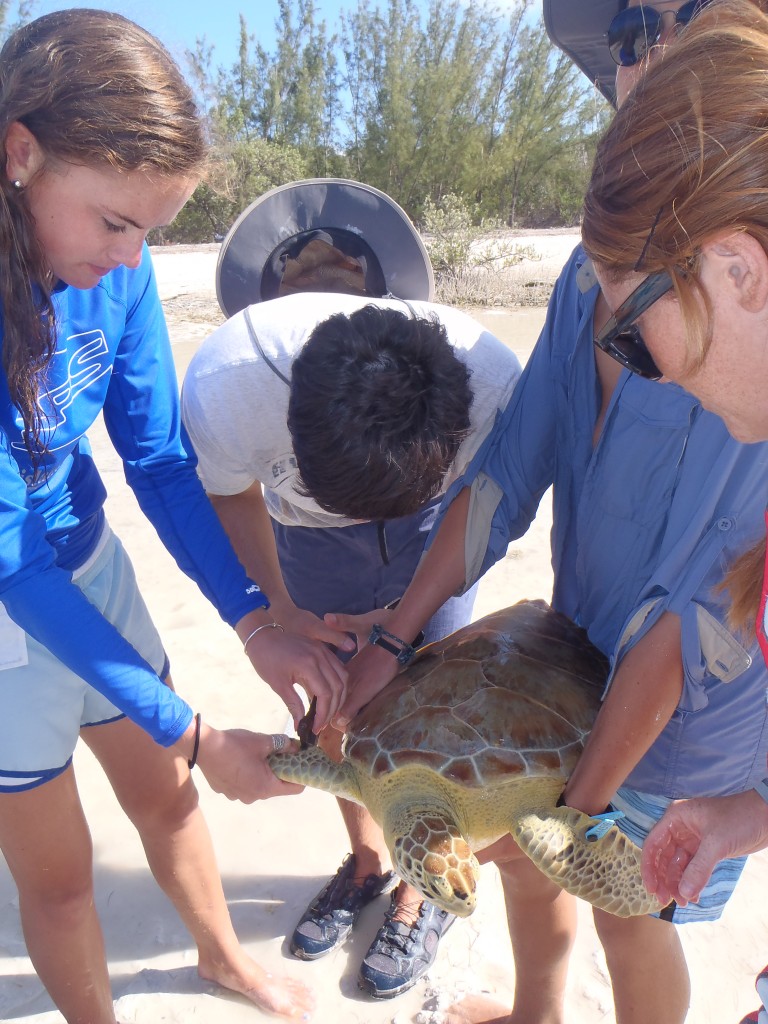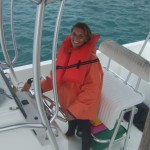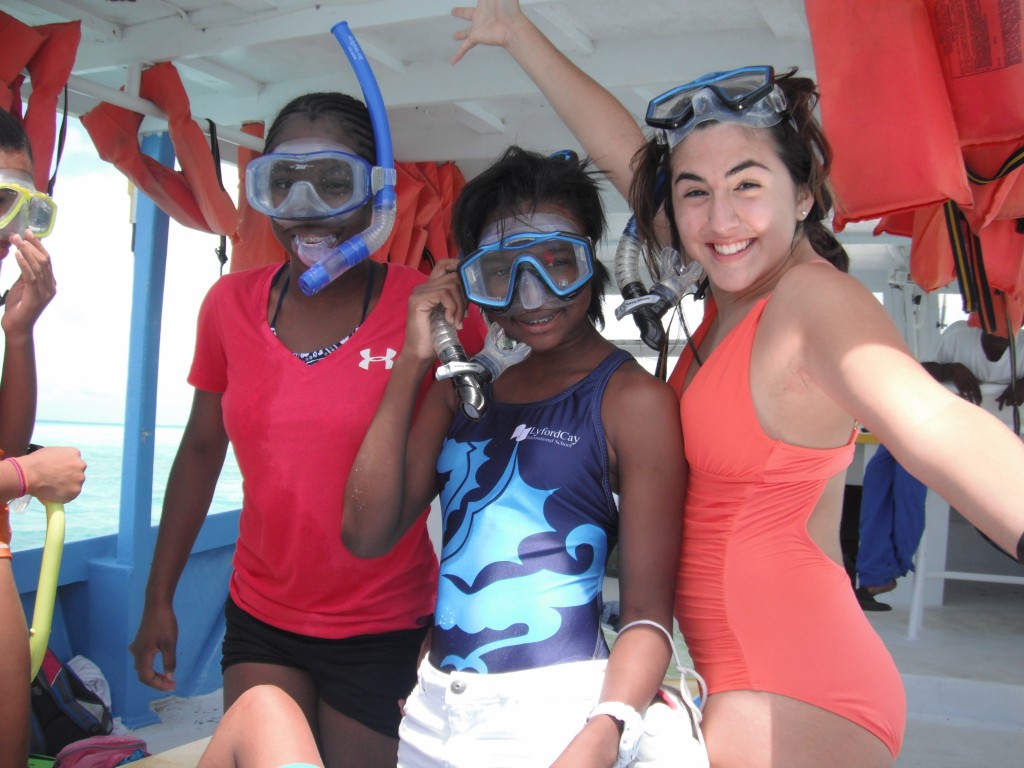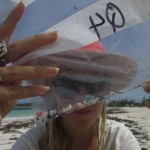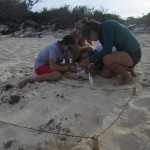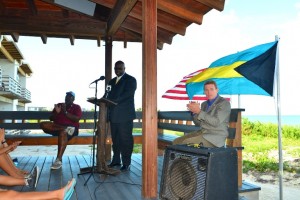Attention! Deadline for registration for CEI’s Eleutheran Explorer’s Camp, Shark Week, Flats Week, and the new Turtle Week has been extended to JUNE 15. Please see the links below for informational flyers about the camps!
Category Archives: Student Research
Lyford Cay at CEI
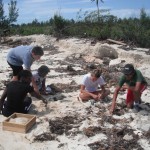 Lyford Cay grade 8 had a busy 3 days here at CEI diving into the plastics curriculum as well as some of the fun yet educational activities typical of our Island School programs: Sandbar geology, Lionfish lesson/dissection, and reef ecology lesson & snorkel.
Lyford Cay grade 8 had a busy 3 days here at CEI diving into the plastics curriculum as well as some of the fun yet educational activities typical of our Island School programs: Sandbar geology, Lionfish lesson/dissection, and reef ecology lesson & snorkel.
Weather was a tad windy for snorkeling at 4th hole but they did have a chance to check out the reef balls. Successful plastics research was conducted on 4th hole beach with Miss Kristal Ocean herself and the results will be used in their science class back at Lyford.
St. Andrews visits CEI
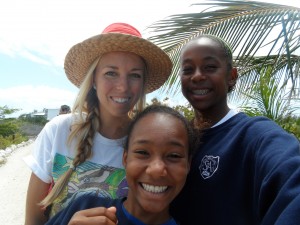
Last week, Educational Programs at CEI had their hands full with two classes hailing from St. Andrew’s School in Nassau, home of the Hurricanes. The first class, a group of 17 students, had a blast helping the plastics, lionfish, and bonefish research teams. Students arrived from Nassau and executed their first day nicely with lots of energy and enthusiasm! The first item on the agenda was a sustainable systems scavenger hunt, exploring the grounds and learning important facts about sustainability initiatives around campus. That afternoon, they spoke with Kristal Ambrose, Patch Reef Researcher & plastic enthusiast, on her plastics research project at CEI. Although the rain put a damper on data collection, they were able to conduct beach plastic surveys the next afternoon and utilize this data for their Math class back at
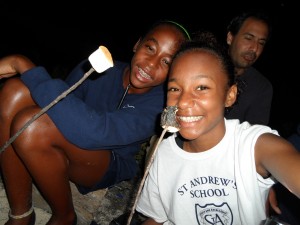
St. Andrew’s. The second day they headed down island to explore the caves of Rock Sound, journal at the Banyon Tree, and swim in Ocean Hole. That afternoon they took a stroll down the beach at Paige Creek to learn about the Flats ecosystem and chat with Liane Nowell about her exciting master’s project on Bonefish. The day ended with a bonfire and s’mores on the beach! Their last day started with a joyful school reunion when the second class from St. Andrew’s arrived. Continue reading
Island School students present introductions to their research projects
This past week, the SP13 Island School students presented Project Introduction presentations to their peers, staff, faculty, and the many visitors on campus. These presentations gave the students a chance to stand up in front of a crowd, and display their knowledge of the background, purpose, and methodology of their specific research projects. 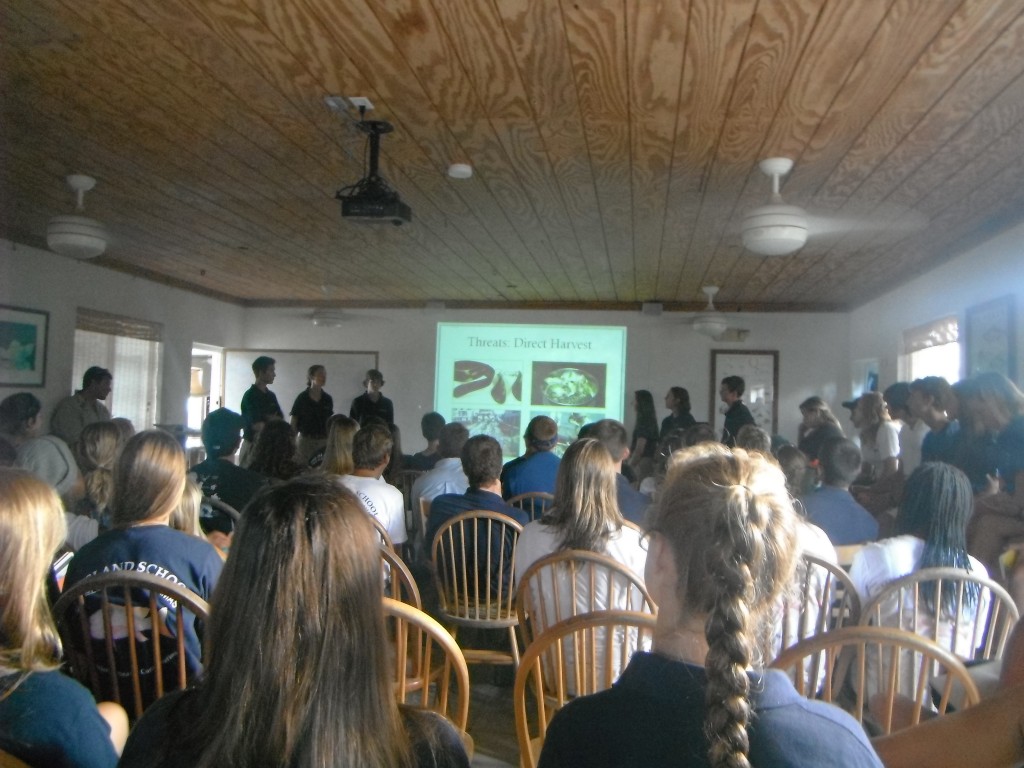
Research projects this year include 1) lionfish and lobster competition, 2) shark physiology after longline capture, 3) effects of climate change on bonefish swimming capacity, 4) effects of decreasing pH on mangrove fish, 5) identifying juvenile queen conch nurseries, 6) green sea turtle habitat use, 7) the settlement of juvenile lionfish, and 8) coral vs. algae cover on patch reefs. These projects are led by CEI researchers, and the students have the chance to work closely with with researchers for the duration of their Island School research class. The class culminates with a Research Symposium, where the students present a scientific poster on the findings of their projects. Continue reading
Plastic Pollution Project starts at CEI
On Thursday of last week, the Marine Plastic Pollution Team at CEI embarked on their first full day of plastic research. The team, which was led by Kristal Ambrose and consisted of several CEI staff members and IS students, set out to analyze macro- and micro-plastic concentrations on beaches in South Eleuthera. Using precise survey protocols designed by NOAA, the team managed to successfully survey three beaches on the Atlantic side of the island, including North Side Beach and Winding Bay
.
Another visiting program experiences Eleuthera!
This eyewitness account was written by a student in the University School-Hathaway Brown Program:
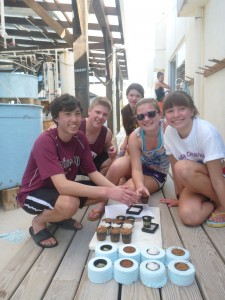 Before getting started, allow me to explain one reason why the Island School was such an eye-opening, incredible experience for my group and me. We are from Cleveland. Between the incessant snow and cloudy days, it seems that conservation is the last thing on our minds. So when our science research-based school club (the Anderson Scholars) of five boys, in addition to five girls (also interested in science research) from our all-girls sister school Hathaway Brown, received the notice that we would be spending a week in the beautiful, sunny Bahamas, we didn’t know what to expect.
Before getting started, allow me to explain one reason why the Island School was such an eye-opening, incredible experience for my group and me. We are from Cleveland. Between the incessant snow and cloudy days, it seems that conservation is the last thing on our minds. So when our science research-based school club (the Anderson Scholars) of five boys, in addition to five girls (also interested in science research) from our all-girls sister school Hathaway Brown, received the notice that we would be spending a week in the beautiful, sunny Bahamas, we didn’t know what to expect.
The Island School is its own microcosm of shape shifting individuals. From the engaging curriculum, an individual becomes a motivated student. From the hands-on outdoor activities, one becomes a 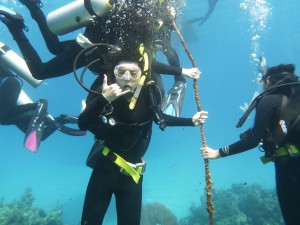 teammate. From the encouragement of others, one transforms into a leader. While most schools are trying to discover a way to make their curriculum applicable to the outside world, the Island School has already developed several tried and true methods to make it a precedent for said schools. The school is a place where the words “when will I ever use this outside of class?” will never be uttered from a student’s lips. The students are warm, outgoing, and most importantly, passionate; they are passionate about school, conservation, and lifting each other up. The science researchers are driven, and extremely helpful. Continue reading
teammate. From the encouragement of others, one transforms into a leader. While most schools are trying to discover a way to make their curriculum applicable to the outside world, the Island School has already developed several tried and true methods to make it a precedent for said schools. The school is a place where the words “when will I ever use this outside of class?” will never be uttered from a student’s lips. The students are warm, outgoing, and most importantly, passionate; they are passionate about school, conservation, and lifting each other up. The science researchers are driven, and extremely helpful. Continue reading
Gap Year Update #2
An excerpt from the Gap Year Student update from Gapper Will Fox:
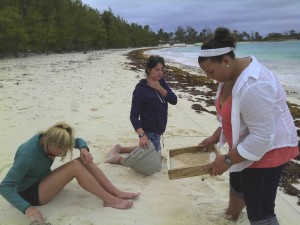 One of our last activities of the
One of our last activities of the 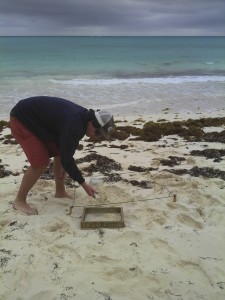 week was on beach plastics with Kristal. We started in the presentation room, watching Kristal’s presentation on her experience researching the Pacific Ocean gyres. We then went out to a beach in Wemyss Bight to do some surveying. The results we got were pretty surprising — we found a ton of micro plastic pieces in each of the quadrants we surveyed in. The microplastics came from larger pieces of plastic in the ocean breaking up, a current environmental issue that researchers at CEI are hoping to learn more about in order to affect change both locally and globally. Continue reading
week was on beach plastics with Kristal. We started in the presentation room, watching Kristal’s presentation on her experience researching the Pacific Ocean gyres. We then went out to a beach in Wemyss Bight to do some surveying. The results we got were pretty surprising — we found a ton of micro plastic pieces in each of the quadrants we surveyed in. The microplastics came from larger pieces of plastic in the ocean breaking up, a current environmental issue that researchers at CEI are hoping to learn more about in order to affect change both locally and globally. Continue reading Carleton University visits CEI to study coral reef communities
From December 27th, 2012 to January 10th, 2013 a field course from Carleton University, led by Dr. Nigel Waltho and coordinated by the Ontario Universities Program in Field Biology, came to CEI to 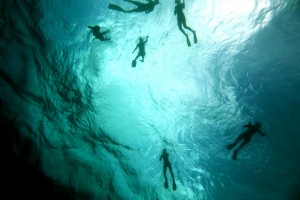 conduct reef ecology research. Through snorkeling and scuba diving, 8 teams of students studied the distribution and community organization of various marine habitats as it relates to ecological processes. Some examples of projects included studying the effects of the lionfish invasion on fish community structure, studying fish species richness and abundance relative to a gradient of habitat types, as well as interspecific competition for space among corals, sponge and algal species.
conduct reef ecology research. Through snorkeling and scuba diving, 8 teams of students studied the distribution and community organization of various marine habitats as it relates to ecological processes. Some examples of projects included studying the effects of the lionfish invasion on fish community structure, studying fish species richness and abundance relative to a gradient of habitat types, as well as interspecific competition for space among corals, sponge and algal species.
The course included writing a proposal, species identification, 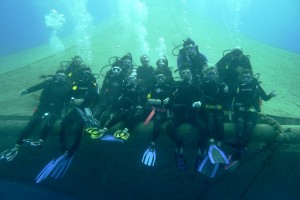 project design, data collection, statistical workshops, and a final scientific paper. These final reports, in addition to their publication potential, will have the opportunity to be used by the Bahamian government to inform local conservation efforts. Highlights from the trip included seeing a whale shark, squid, eagle rays, a hammerhead shark as well as attending local Bahamian Junkanoo festivals and exploring the island!
project design, data collection, statistical workshops, and a final scientific paper. These final reports, in addition to their publication potential, will have the opportunity to be used by the Bahamian government to inform local conservation efforts. Highlights from the trip included seeing a whale shark, squid, eagle rays, a hammerhead shark as well as attending local Bahamian Junkanoo festivals and exploring the island!
Research Assistant Project Update – Brendan Talwar
Brendan Talwar, research assistant for the Shark Conservation and Education Program, has been working on a research project during his time at CEI. Here he describes his research:
My research focuses on the use of unbaited video cameras placed in the mouth of tidal creek
systems. I’m using this method to investigate the behavioral ecology of elasmobranchs, focusing on the lemon shark (Negaprion brevirostris). These sharks enter mangrove creek systems during incoming tide to seek refuge from predators, as well as to forage among the mangrove prop roots.Given the plight of shark populations worldwide, and the lack of non-invasive methods of population assessment, the use of unbaited video in coastal ecosystems will lay the groundwork for completely hands off research techniques in the future.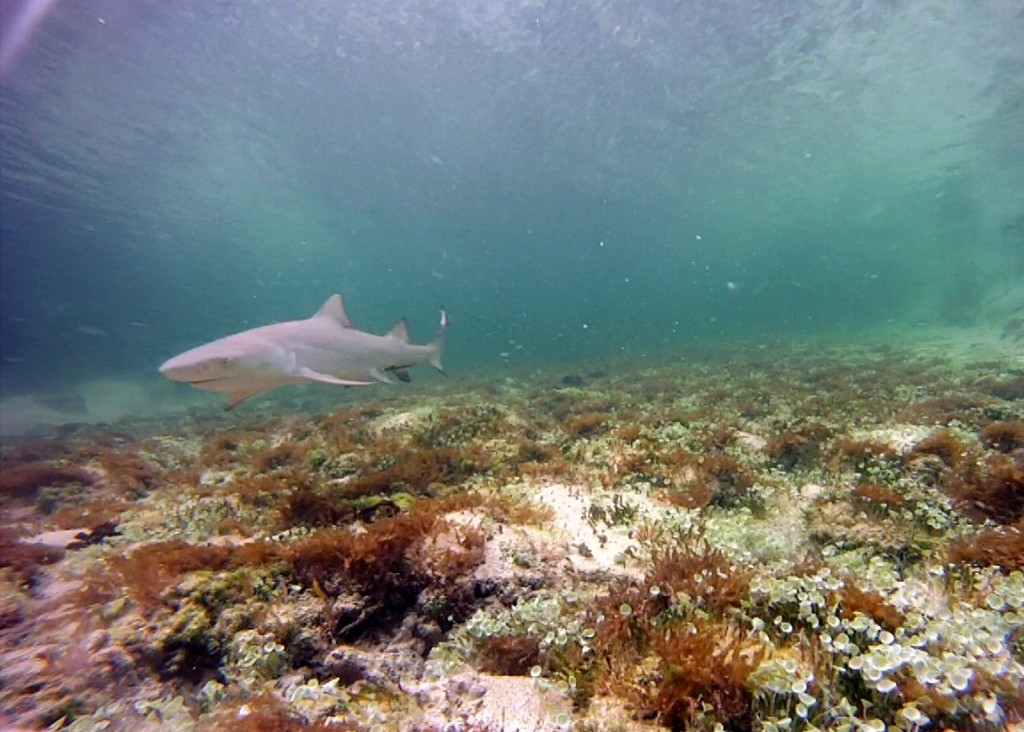
28th Research Symposium recently held at the Cape Eleuthera Island School
This past Saturday, December 1st, marked CEI’s 28th Research Symposium. During the Symposium, Island School students got the chance to showcase the culmination of a semester’s worth of research to a large audience. Visiting scientists, local community members, government officials, and representatives of Bahamian NGOs were all present for the event. The list of guests included members of REEF, BREEF, Friends of the Environment, Community Conch, The Nature Conservancy, Bahamas National Trust (BNT), and Fisheries Conservation Foundation. We also had the Honorable Kendred Dorset, Minister of The Environment and Housing, as our keynote speaker! 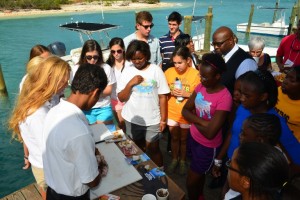 There were presentations on topics ranging from queen conch conservation and the lionfish invasion to the effects of climate change on bonefish and sea turtle habitat use. Students gave presentations, followed by poster sessions, where visitors had one on one time with the research groups to ask questions on the projects and their larger implications.
There were presentations on topics ranging from queen conch conservation and the lionfish invasion to the effects of climate change on bonefish and sea turtle habitat use. Students gave presentations, followed by poster sessions, where visitors had one on one time with the research groups to ask questions on the projects and their larger implications.
The symposium allowed a chance for guests to learn about the great work being done at CEI. After the poster sessions, the students got a chance to hear from some prominent guest speakers. Eric Carey, Executive Director of BNT, encouraged the students and audience members to stay passionate in their goals of marine conservation and sustainable living. Dr. Sandy Mactaggart, Chancellor Emeritus at the University of Alberta, then spoke, telling an inspiring story to the students to emphasize the importance of innovation in problem-solving, a skill that students acquire in their semester at The Island School. Continue reading
